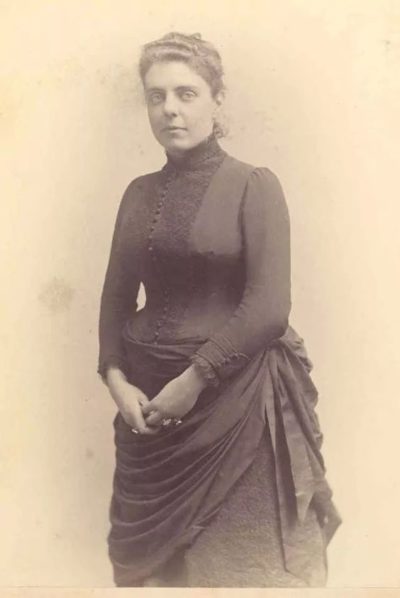Bamie Roosevelt (Bamie Roosevelt)

Bamie Roosevelt was born in a brownstone home at 28 East 20th Street in New York City on January 18, 1855. She was the eldest child of businessman/philanthropist Theodore “Thee” Roosevelt (1831—1878) and socialite Martha Stewart “Mittie” Bulloch (1835—1884). In addition to brother Theodore Jr. (T.R.) (1858—1919), Bamie’s siblings were socialite Elliott Bulloch Roosevelt (1860—1894) and writer/speaker Corinne Roosevelt (1861—1933). Bamie was afflicted by a spinal ailment that led to her being partially crippled and confined by corrective steel braces as a child. T.R.’s daughter Alice once remarked that had Bamie, with her incredible intelligence and energy, been born a 19th Century man, without the social restrictions that the era placed on women, she would have been president instead of her brother. Elliott’s daughter, Anna Eleanor Roosevelt, stated in her autobiography that Bamie had “an able man’s mind.” Although she was not seen as a stunningly gorgeous woman like her mother or her sisters-in-law, her natural intelligence and energy was magnetic to both men and women. She remained an emotional pillar of strength for all the Roosevelts. Because Bamie’s mother, Mittie, was often distracted by illness or by her grand social life, Bamie Roosevelt increasingly took a central role in running the Roosevelt household, particularly after the premature death of her father, Thee. In fact, T.R.’s elder daughter Alice remarked that Bamie almost seemed to be born into middle age, so significant were the adult responsibilities put into her hands from childhood. Unlike many children in a similar situation, Bamie had the natural maturity, judgement, and wisdom to “hold the family together,” Alice said.
When T.R.’s first wife Alice died suddenly following childbirth, most probably of kidney failure (Bright’s Disease) or toxemia, Bamie took custody of young Alice. Because her grieving father initially would not call her by his late wife’s name, Alice was called “Baby Lee” for her mother’s family, the Lees of Boston. Alice would say of Bamie that she was the most influential person in her entire life. When the young and vivacious Alice became more than her stepmother, Edith Kermit Carow, or her father could handle, they would send her up to Auntie Bye for a dose of discipline and to give her the structure that the Roosevelts in the White House were not able to exert. Elliott’s wife Anna Rebecca Hall had wished for Bamie to have custody of her children Eleanor, Elliott Jr., and Gracie Hall Roosevelt upon her death. She was separated from her husband, and died young of diphtheria. Custody of the children was not immediately possible because Elliott was still alive—though exiled by the family because of his alcoholism—and could not be bypassed in the event of litigation. Bamie Roosevelt considered a custody suit but realized that Anna’s mother Mary Livingston Ludlow would not be willing to give the children into Bamie’s care. She did open her home to Eleanor, who was a welcome visitor and made extended stays. Bamie was successful, though, in getting Eleanor out of the oppressive and harrowing home situation by demanding that she be sent to Allenswood school for girls in England where Eleanor developed socially and emotionally. During Eleanor and Alice’s childhood, Bamie kept them informed of each other’s activities, helping to maintain something of a relationship between the two, though it was a vexing relationship, ranging from sometimes being very close and often a bitter and competitive relationship. She was close to both girls and contributed greatly to their development.
Bamie Roosevelt and her niece, Eleanor Roosevelt, eventually reconciled, and in an article in the Ladies Home Journal, “How to Take Criticism,” Eleanor referred to her aunt Bamie, saying, “I can honestly say that I hate no one, and perhaps the best advice I can give to anyone who suffers from criticism and yet must be in the public eye, would be contained in the words of my aunt, Mrs. William Sheffield Cowles. She was President Theodore Roosevelt’s sister and the aunt to whom many of the young people in the family went for advice. I had asked her whether I should do something which at that time would have caused a great deal of criticism, and her answer was: ‘Do not be bothered by what people say as long as you are sure that you are doing what seems right to you, but be sure that you face yourself honestly.'” Alice and Eleanor’s warmest link to their fathers’ generation died on the night of August 25, 1931, aged 76. Her last words, “Never mind, it’s all right,” were reportedly spoken to her friend Sara Delano, President Franklin Delano Roosevelt’s mother, before Bamie slipped into a coma and died.
Born
- January, 18, 1855
- USA
- New York, New York
Died
- August, 25, 1931
- USA
- Farmington, Connecticut
Cemetery
- Riverside Cemetery
- Farmington, Connecticut
- USA



